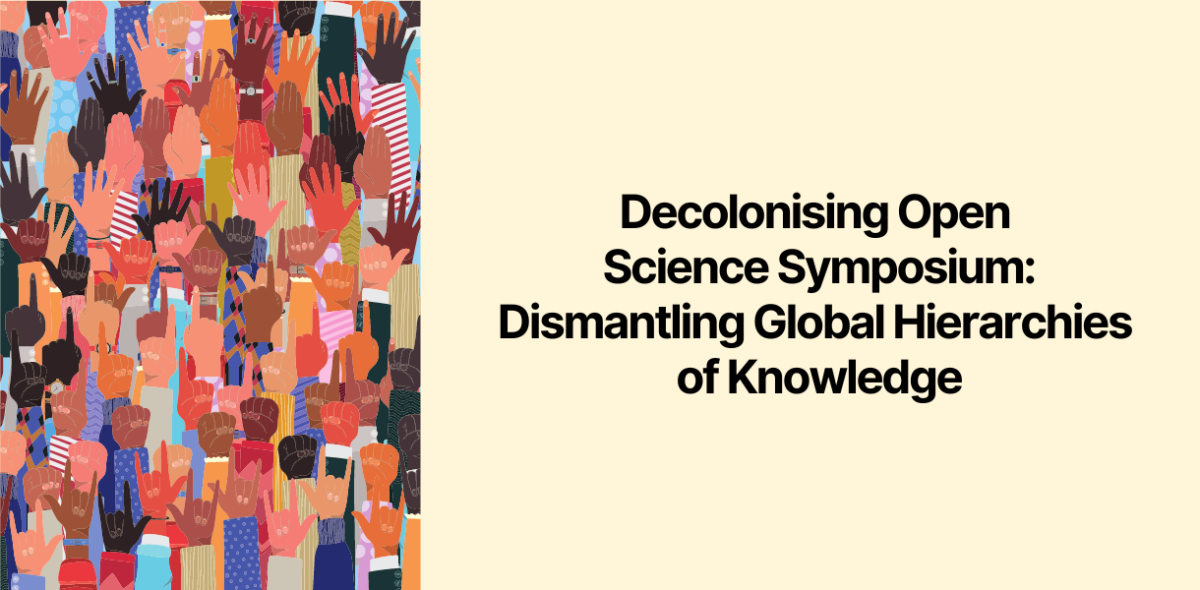This January, the Forum of Open Reseach MENA hosted its first community development activity of 2024. The “Decolonising Open Science Symposium: Dismantling Global Heirarchies of Knowledge” addressed the influence of western prominence on knowledge distribution and research, highlighting how these ideologies and standards impact the Arab region.
Within the landscape of research, conversations and collaborations not only address inequalities but also break barriers to accessibility. In this blog, we interviewed Nahil Nassar who is the community engagement manager at the Forum of Open Research MENA. At the symposium, Nahil touched on the work that open science has in building stronger foundations for diverse research consumption and the biases that exist in the research landscape. We take a deeper dive into this conversation.
- How does F.O.R.M. facilitate conversations around decolonising academia?
FORM is a community based organisation that centers its attention on the Arab region. That means prioritising Arab voices in academia to develop a regionally and culturally relevant model of Open Science to implement across the board.
While we do, of course, work with organisations that are based in the Global North, we try to be transparent when it comes to power dynamics, and recognise that we are only as strong as our community.
- What role does open science play in escalating research outside western europe?
Open Science has the potential to really build an even playing field for researchers in the Global South because of its financially and digitally accessible model. In its best form, Open Science should allow researchers from the Global South to publish their work without limitations in cost or geography.
The problem is that Open Science publishing is not always functioning in its most optimum form, and things like APCs, metric frameworks, and language hierarchies (English being a dominant language across the research landscape) can still limit researchers in the same ways that traditional academic publishing models do.
- What are some biases that exist in the open science landscape?
A major bias that comes out of the Open Science landscape, especially when it comes to the Global South, is that Open Science research is bad research. There’s this assumption that if research isn’t published in perfect English, or focuses on a very niche subject that’s really only relevant to specific local contexts, then that means the research is either low quality or irrelevant.
This is especially because of how research is prioritised in its value these days, and this is one of the many places where commodification enters the conversation as a major issue. Often times, major funding is only allocated to research that is deemed important by multinational corporations or prestigous research institutions in the Global North who sort of set the agenda of what is necessary to study and what isn’t – and these topics are usually prioritised based on the needs of these entities and their contexts, and completely ignore the localised needs of researchers in the Global South, who then don’t have access to that same funding.
- Please explain how absolute objectivity is colonial ideology
This is a really interesting ideology to ponder on in decolonial discourse, because it seems very out there to say that there’s no such thing as objective truth, especially in a world that is run by scientific innovation. The idea of objectivity may seem to be clear and cut, but it goes back to the idea of intellectual dominance and colonialism. There was an ideological hierarchy set by colonial powers that placed their “truth” as the only “truth”, and took objectivity to mean that their truth is the only one with any substance or value.
Many indigenous knowledge systems question this idea of absolute objectivity, because it is often rooted in inherently colonial, patriarchal, and violent understandings of nature, human experience, and society. I was first introduced to this philosophy through postcolonial gender theory, where researchers like Vandana Shiva questioned the very idea of scientific knowledge as we know it today as something that was forced on us as the only virtuous fact, but is sometimes actually the most harmful opinion.
- What is the direct impact of colonisation on knowledge production today?
The impact of colonisation on knowledge production today can be found in a plethora of arenas. While colonisation as we once knew it is not nearly as prominent as it was in the 19th and 20th centuries, neo-imperial and neo-colonial ideologies are still very much strong holding the majority of the world’s systems. You can see legacies of it in how we think about scientific studies, methodologies, or even the metrics that we use to classify ‘good’ and ‘bad’ research.
It informs how we think about credibility, and determines who gets to speak the loudest and whose voice gets silenced. It marginalises researchers who use indigenous knowledge methodologies (often rooted in intuition and connection to land and spirit) and prioritises the voices of liberal scientists who believe in objective fact rooted in numbers and rationality.
Overall, it prioritises knowledge produced and disseminated by Western organisations and researchers that then have an impact on Western communities, and leave the global majority out of the conversation.
Watch the webinar here
